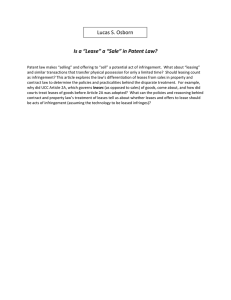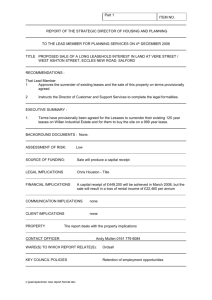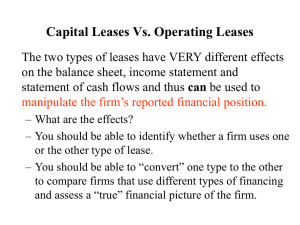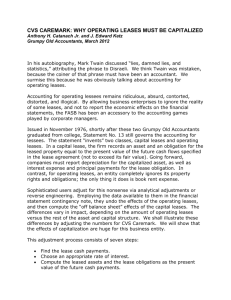New Decision Affects Land Tax Recovery Under Leases
advertisement
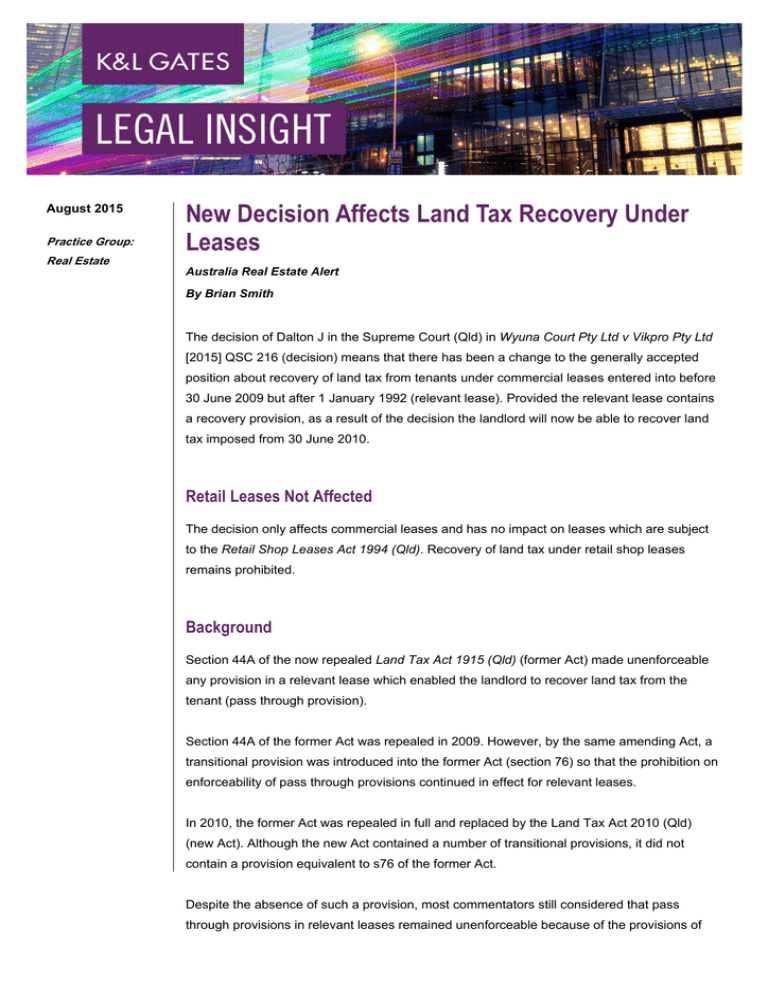
August 2015 Practice Group: Real Estate New Decision Affects Land Tax Recovery Under Leases Australia Real Estate Alert By Brian Smith The decision of Dalton J in the Supreme Court (Qld) in Wyuna Court Pty Ltd v Vikpro Pty Ltd [2015] QSC 216 (decision) means that there has been a change to the generally accepted position about recovery of land tax from tenants under commercial leases entered into before 30 June 2009 but after 1 January 1992 (relevant lease). Provided the relevant lease contains a recovery provision, as a result of the decision the landlord will now be able to recover land tax imposed from 30 June 2010. Retail Leases Not Affected The decision only affects commercial leases and has no impact on leases which are subject to the Retail Shop Leases Act 1994 (Qld). Recovery of land tax under retail shop leases remains prohibited. Background Section 44A of the now repealed Land Tax Act 1915 (Qld) (former Act) made unenforceable any provision in a relevant lease which enabled the landlord to recover land tax from the tenant (pass through provision). Section 44A of the former Act was repealed in 2009. However, by the same amending Act, a transitional provision was introduced into the former Act (section 76) so that the prohibition on enforceability of pass through provisions continued in effect for relevant leases. In 2010, the former Act was repealed in full and replaced by the Land Tax Act 2010 (Qld) (new Act). Although the new Act contained a number of transitional provisions, it did not contain a provision equivalent to s76 of the former Act. Despite the absence of such a provision, most commentators still considered that pass through provisions in relevant leases remained unenforceable because of the provisions of New Decision Affects Land Tax Recovery Under Leases section 20 of the Acts Interpretation Act 1954. That section provides that the repeal of an Act does not affect the previous operation of or a right or privilege acquired under the repealed Act, unless there is a contrary intention expressed in the repealing Act. The Decision in Wyuna Court Justice Dalton found that, contrary to expectation, s20 of the Acts Interpretation Act 1954 does not operate to preserve the prohibition on pass through provisions in relevant leases. She found that as parliament had deliberately decided not to re-enact s76 of the former Act in the new Act, there was a clear contrary intention which displaced the operation of s20. Consequences The result of the decision is that the prohibition on the operation of pass through provisions contained in relevant leases ceased to have effect from 30 June 2010. As a consequence, a landlord under a relevant lease which contains a pass through provision can seek recovery from its tenant of land tax assessed against the land from the 2010 year onwards. In the case of many leases, this could amount to hundreds of thousands of dollars and cause considerable difficulties for the tenant. It could also lead to iniquities, particularly where the rent under the lease was set on the basis that land tax was not recoverable and therefore could be said to contain a component to take that position into account. Caveats There are two important caveats to which regard must be had. Firstly, the decision is by a single Judge of the Supreme Court and may therefore be subject to reversal if an appeal is instituted. Secondly, the government may reverse the impact of the decision by amending the new Act to reinstate the transitional provisions contained in s76 of the former Act. 2 New Decision Affects Land Tax Recovery Under Leases We will know within a reasonably short time if an appeal is instituted (although the determination of any appeal will take some further time). However, it may take considerably longer before we know if the government will take any remedial steps (and no doubt various interest groups within the property industry will have their own views about the desirability of any legislative change). Author: Brian Smith brian.smith@klgates.com +61.7.3233.1289 Anchorage Austin Beijing Berlin Boston Brisbane Brussels Charleston Charlotte Chicago Dallas Doha Dubai Fort Worth Frankfurt Harrisburg Hong Kong Houston London Los Angeles Melbourne Miami Milan Moscow Newark New York Orange County Palo Alto Paris Perth Pittsburgh Portland Raleigh Research Triangle Park San Francisco São Paulo Seattle Seoul Shanghai Singapore Spokane Sydney Taipei Tokyo Warsaw Washington, D.C. Wilmington K&L Gates comprises more than 2,000 lawyers globally who practice in fully integrated offices located on five continents. The firm represents leading multinational corporations, growth and middle-market companies, capital markets participants and entrepreneurs in every major industry group as well as public sector entities, educational institutions, philanthropic organizations and individuals. For more information about K&L Gates or its locations, practices and registrations, visit www.klgates.com. This publication is for informational purposes and does not contain or convey legal advice. The information herein should not be used or relied upon in regard to any particular facts or circumstances without first consulting a lawyer. © 2015 K&L Gates LLP. All Rights Reserved. 3
